The Philippines lacks a cohesive long-term strategy to handle a rising China in spite of sporadic tensions in the disputed seas
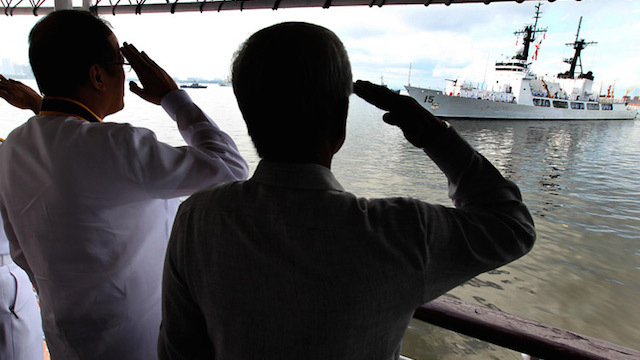
US EXCESS. The Philippine Navy's BRP Gregorio Del Pilar is a 40-year-old decommissioned US Coast Guard Hamilton-class cutter. Malacañang photo
Conclusion
Part 1: Aquino legacy: Defying China
China had been harassing Filipino exploration vessels in Recto (Reed) Bank, an area 80 nautical miles off Palawan that is believed to be rich in oil.
How can the government protect them?
Defense Secretary Voltaire Gazmin said the Navy can send warships to escort the vessels, but President Benigno Aquino III balked at the idea.
“Wait, are we going to war?” the President said, according to an official present during the discussions.
At the time, Malacañang had issued a policy demilitarizing the South China Sea issue to make "international diplomacy" its "first line of external defense."
This meant deploying civilian vessels of the Philippine Coast Guard, which has little capability and even less experience beyond territorial waters.
The Navy, which has traditionally operated in the high seas, vigorously opposed it.
That a Navy warship was eventually sent to Scarborough after a heated discussion in Malacañang prompted suspicions that the military meant to show off the capabilities of a newly acquired warship from the US Coast Guard, the BRP Gregorio Del Pilar.
But then Navy chief Vice Admiral Alexander Pama said the warship was merely on its way to Poro Point in La Union to monitor North Korea’s nuclear missile test launch when it was diverted to arrest the Chinese poachers.
Chinese Coast Guard ships came to stop the arrests and occupied the rocky sandbar off the coast of Zambales province.
Where's long-term strategy?
Beyond the power struggle between the Navy and the Coast Guard, the incident shows that the Philippines lacks a cohesive long-term strategy to handle a rising China. This, in spite of sporadic tensions that have erupted in the area in the past decades, foremost of which was China's seizure of Mischief Reef in 1995.
Former defense secretary Orlando Mercado said the problem is that the Philippines seems to always shift its foreign policy whenever a new president is elected. (READ: Why China prefers Arroyo over Aquino)
"You are dealing with a country that has a millenia of history and looks at problems and its role as being part of a very long interminable continuum. We should have a larger and longer view of public policy," Mercado said. (READ: Little-known fact: Philippines and China are defense partners)
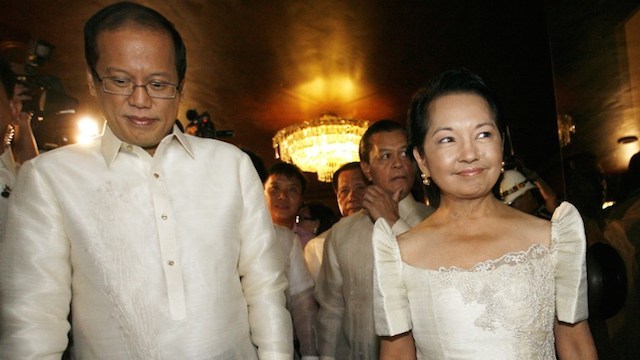
DIFFERENT STYLES. President Benigno Aquino III and his predecessor, former President Gloria Macapagal-Arroyo, differ in their response to China's interests. Photo from Malacañang/PCOO
Aquino ushered in a shift from former President Gloria Arroyo's policy of joint exploration while the country enjoyed the inflow of Chinese loans.
Arroyo's policy was opposed for allowing China access to areas within the country's 200-nautical-mile exclusive economic zone based on the United Nations Convention on the Law of the Sea (UNCLOS).
It didn't help that the loans that were supposed to fund government infrastructure projects were also embroiled in a massive corruption controversy – the botched national broadband deal and the Northrail project, among others.
When he became president, Aquino discontinued Arroyo's Joint Marine Seismic Undertaking. China's harassment in the South China Sea began.
The occupation of Scarborough, two years into his presidency, marks the first time since 1995 that China sought to change the status quo in the disputed seas.
This would be followed by the aggressive reclamation of shoals to create artificial islands that are feared to become military bases.
Grounding warships
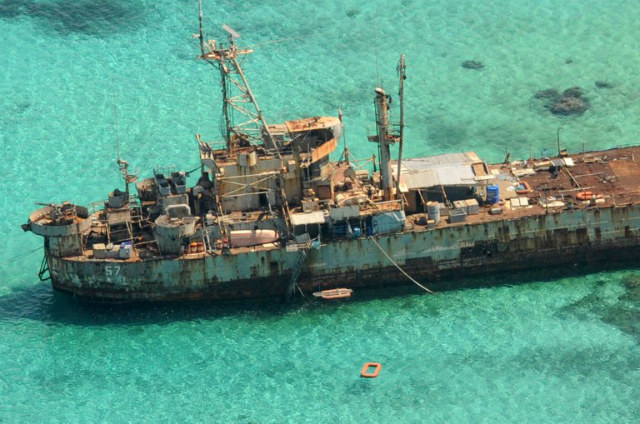
NAVAL OUTPOST. The grounded BRP Sierra Madre is manned by about a dozen Marines
The administration of Joseph Estrada already feared a "creeping invasion", following the Chinese occupation of Mischief Reef, recalled Mercado, the defense chief then.
The Philippines purposely grounded a warship on a shoal that the government believed was China's next target – Ayungin Shoal. It has since served as the country's naval outpost.
"I was even saying we should breach more LSTs (landing ship tanks). Under the circumstances, we have no means by which we can set up structures the way the Chinese are doing it," Mercado told Rappler.
But Aquino is not satisfied with just stopping China. He wants Scarborough back.
So when China declared in November 2012 that its ships won't leave the shoal, the Philippines thought it had no choice but to go file an arbitration case.
The Philippines adopted a hardline stance against China. The word war was led by the President himself.
But there is a sense among some government officials that the Philippines has gotten itself in the middle of a proxy war between the US and China.
West PH Sea Senate hearing'We don't have to choose by virtue of our strategic location because we have access to both the Pacific and the South China Sea.'
– Former military officer
Some attributed the country's response – filing a case – to the character of the President. “Palaban talaga siya (He's really a fighter),” said one top official.
It is a black and white issue as far as the President is concerned. He likened China to "Nazi Germany", recalling how World War II started because of the international community's failure to contain Adolf Hitler.
Although back-channel negotiator Senator Antonio Trillanes IV was isolated in July 2012 when he voted in favor of continuously engaging China – instead of immediately raising the Scarborough standoff before ASEAN – he received some quiet support.
Officials knew that in spite of their opinions, the government has to speak with "one voice."
Trillanes played a role in de-escalating tension with China during the standoff, said a Palace source. But those interviewed by Rappler did not support the senator's track of going for bilateral talks. They were hoping for a possible middle ground.
Years later, in a Senate hearing, Trillanes called in May 2015, Aquino's China policy was put on the spotlight and for the first time provided a venue for the critics – academics and former security officers – to warn againt the repercussions of the Philippines' actions against China.
"I know a lot of people in DFA (Department of Foreign Affairs). There are a lot of good people there but you get this feeling that they're also frustrated that not all of the inputs are being considered," said maritime law expert Jay Batongbacal in an interview after the hearing.
The need to open communication lines with China was stressed. (READ: China on talks with PH: No need to drop case)
The split
The split is largely defined by different long views of the future.
Supreme Court Senior Associate Justice Antonio Carpio represents the hardline position of those who see the clear and present danger of China taking more territories and pushing its borders toward the country's shores.
The other side that is uneasy about – if not categorically opposed to – the arbitration case is not so afraid of the rise of China and believes that the Philippines should instead adapt to its growing influence in the region.
"They're not going away. These are the realities that you have to take. How do you cope and how do you deal with this? This is the challenge of our leadership," said Mercado.
A retired military officer said talks with China may not have been exhausted during the standoff in a way that could have enforced a "status quo ante order (the way things were)" – to get Scarborough back without turning it into a big international dispute.'Conventional wisdom in DFA when I was there was that China is more important than the US.'
– Former diplomat speaking to Rappler anonymously
Others argue that dealings with China should be done the "Asian way," which means talking. Chinese declarations that it won't leave Scarborough Shoal should not have been taken as non-negotiable position, but a starting point that may be softened when the two countries sit down and talk.
A fellow officer disagreed, however. "Sa tingin mo, maaawa sa atin ang China at ibabalik ang Scarborough?" (You think China will take pity on us and return Scarborough?)
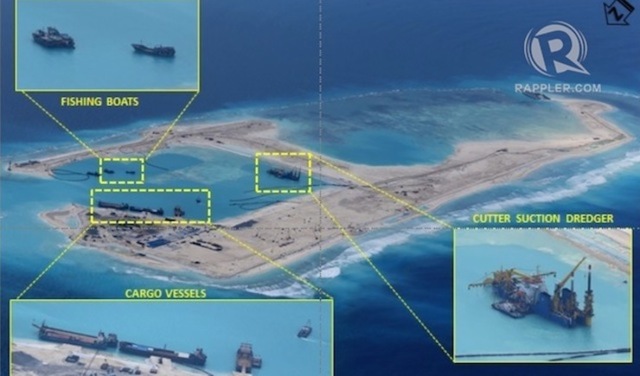
AIRSTRIP. China is building in Fiery Cross Reef its first airstrip in the Spratlys
They lamented how the country is now suffering the consequences of its position against China.
They believe that China's aggressive reclamation in the Spratly Islands was prompted by the country's case, meant to preempt any ruling by the arbitration court.
They also noted how the country has been out of the loop in China's development plans in the region.
This group doesn't share Carpio's confidence that China will be forced to follow the tribunal ruling.
Another said: "Mas malaking problema (It's a bigger problem) if we win." He's afraid of what China will do to show its defiance of the ruling. (READ: Thought Leaders: Powerplay in the South China Sea)
Aquino's gambit
This is all water under bridge.
Batongbacal said there's no value debating whether or not the Philippines should have filed the case.
He said the government should instead focus its energy on contingency measures for incidents that may rise because of the tension caused by the case.
The region has grown militarized as maritime disputes escalated and neighbors beefed up security by acquiring fighter jets and submarines.'We're looking at making sure that it doesn't get any worse than it already is. You don't lose anymore and there's no incident that sparks a major conflict.'
- Jay Batongbacal, maritime law expert
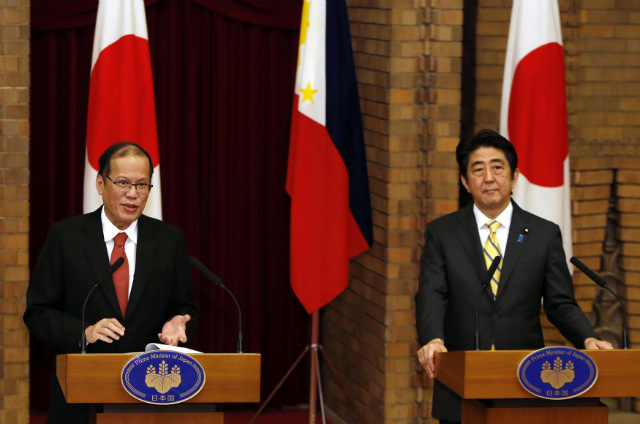
VFA. President Aquino and Japanese Prime Minister Shinzo Abe agree to improve defese ties. Malacañang photo
The Philippines also strengthened its alliance with Japan, seeking to give it access to its military bases.
China miscalculated, said former ABC News Beijing bureau chief Chito Sta Romana.
Will it come down to a gun battle? Malacañang officials said the risk is low because both camps realize it is not to anyone's interest to blow up the situation into a war.'The problem now is that the Chinese were basically expecting the Philippine counteraction, which is diplomatic protest, to go to ASEAN. They didn't expect the US would react this way. So the Chinese, I think, have certainly made tactical, and possibly, a strategic miscalculation.'
– Chito Sta Romana, former ABC News Beijing bureau chief
Rules of engagement are in place to make sure the Philippines doesn't start any tension, said a senior security officer. The Navy and the Coast Guard are also learning to work together.
Still, the risk of miscalculations at sea is prompting calls for the Philippines to establish a sort of a red button to be able to talk to China in case of misunderstandings at sea.
“When a gun battle erupts, it’s a slippery slope," warned a former Navy officer.
Malacañang said it will talk to China, but only when the Tribunal has issued a ruling. A favorable decision, the Palace argued, will put the Philippines in a stronger position to negotiate.
History will judge Aquino’s stand on this matter. The next generation will benefit or suffer from it.
http://www.rappler.com/newsbreak/in-depth/99116-part-2-china-problem-no-long-term-plan

No comments:
Post a Comment
Note: Only a member of this blog may post a comment.